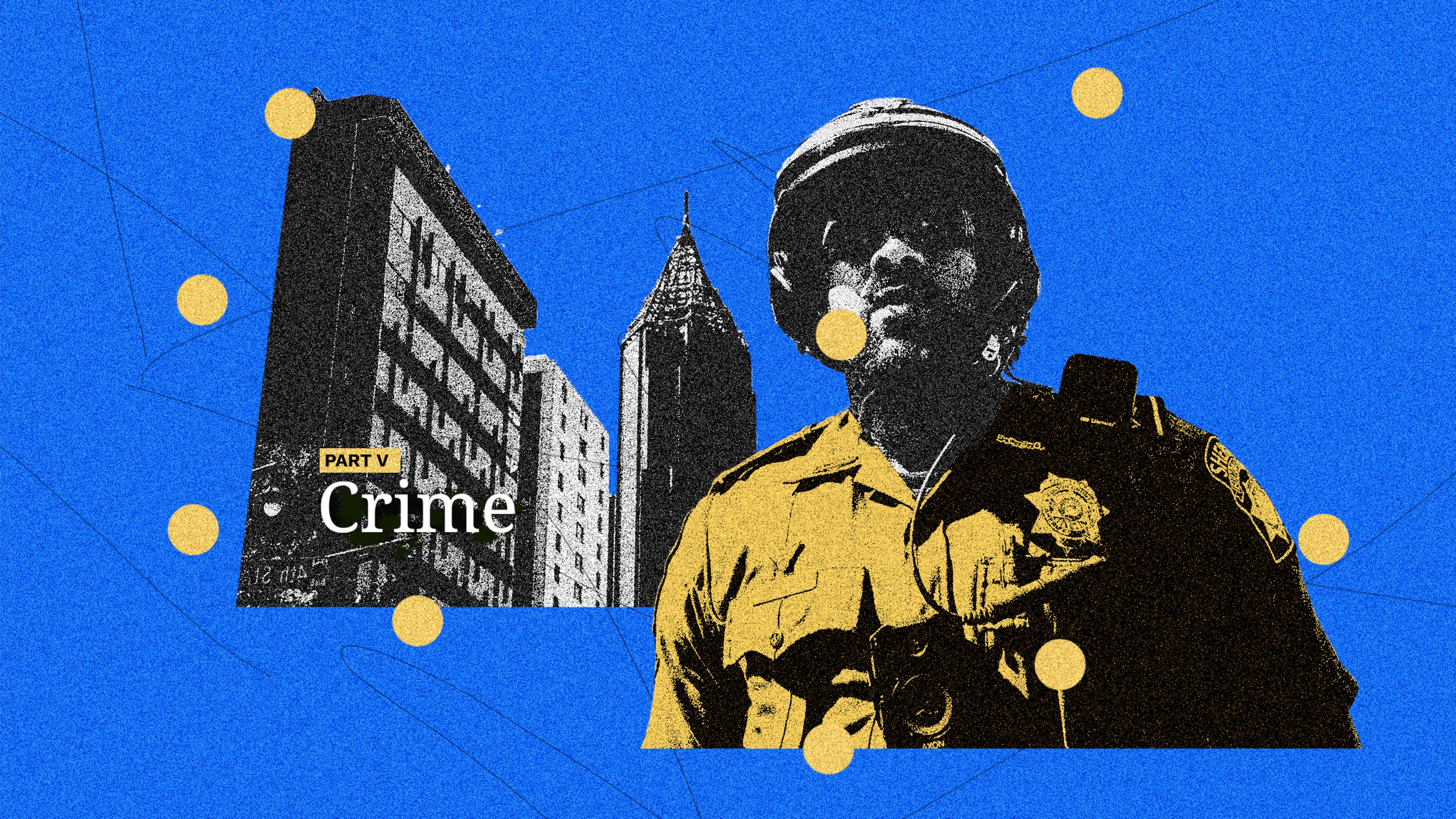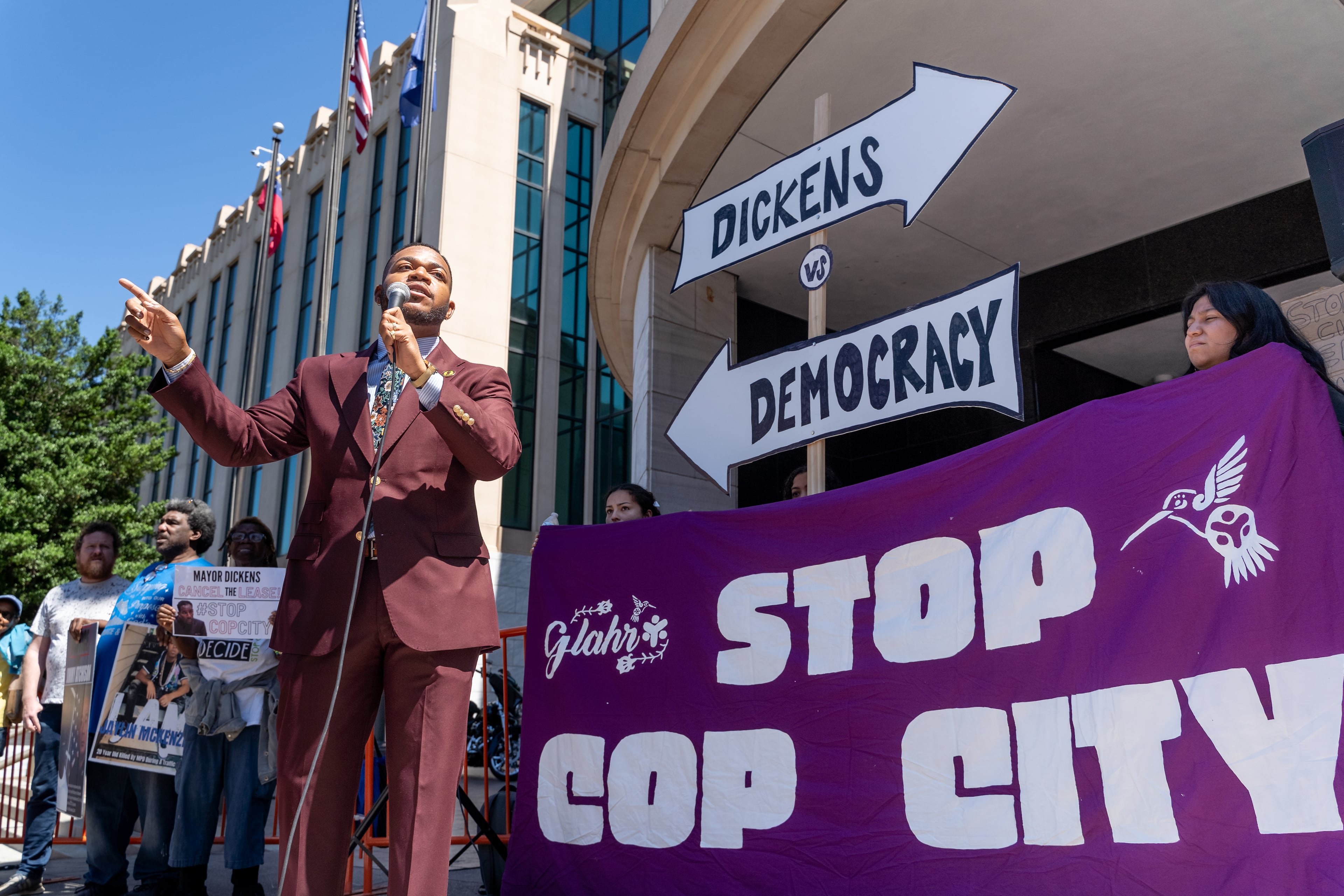Homicides down, police staffing up heading into Atlanta’s elections

When Atlanta Mayor Andre Dickens announced his bid for the city’s top job in 2021, homicides were at a two-decade high and police officers were leaving the force in droves.
Gun violence spiked in major cities across the country a year earlier as the COVID-19 pandemic raged, and people took to the streets in protest of police brutality.
In the months that followed, some of Atlanta’s officers applied to other agencies or left the profession entirely. Many cited a lack of support — especially after some were fired or criminally charged in use-of-force cases.
Meanwhile, a number of Buckhead residents who felt unsafe amid the spike in killings led a cityhood movement that threatened to devastate the city of Atlanta’s finances.
Fast forward more than four years and crime statistics continue to trend down across Atlanta, and the Buckhead cityhood movement failed. Now Dickens, who campaigned on a platform of improving public safety, is looking to ride that wave of crime reduction to an easy reelection.
“By the time I complete my second term, I want people landing at the world’s busiest airport to see a sign that welcomes them to the safest large city in America,” the mayor said at a recent event.
The city’s controversial $117 million police and fire training facility is up and running, the number of new police recruits is at a five-year high and morale has drastically improved within the department, Atlanta Police Chief Darin Schierbaum told The Atlanta Journal-Constitution.
As of last month there were nearly 1,800 officers on staff, up from about 1,500 in early 2021, according to the chief.
“We had 2020, the pandemic, the civil unrest, what was perceived to be nonsupport for the police,” Schierbaum said. “A lot of people left then, so we’re building back.”

Increased pensions and better officer pay should help keep Atlanta competitive amid nationwide officer shortages, the chief said. If his department can maintain its hiring and retention rates, Schierbaum said he’s optimistic APD can reach its authorized strength of more than 2,000 officers in 2027.
He said the new training center has been a draw for some recruits, especially “lateral transfers” joining from other cities with hopes of advancing through the ranks. The Atlanta Police Foundation is also offering $10,000 signing bonuses in an effort to lure more experienced officers ahead of next year’s FIFA World Cup.
Meanwhile, the city’s homicide rate continues to fall. As of October, Atlanta police had investigated 71 killings since the start of 2025, down from 98 this time last year, the department said. By comparison, there were 157 homicides in 2020.
Crime data shows the number of reported aggravated assaults, burglaries and thefts from vehicles all dropped across the city between 2020 and 2024. The number of robberies decreased by nearly 40% during that time frame while the number of stolen vehicles increased 13%, according to data analyzed by the AJC.
Through the end of October, this year’s reported robberies and aggravated assaults are on pace to surpass 2024 totals.
Experts note that shootings and homicides are down in most major cities compared to the pandemic, and some question whether the recent drop in certain crimes should be directly attributed to the mayor and police.

“Just like we can’t blame an administration for an increase in crime, you have to be careful crediting them with a decrease,” said Thaddeus Johnson, a Georgia State University criminologist and former police captain in Memphis, Tennessee.
He said issues such as police misconduct, racial disparities in arrests, crime spikes in specific neighborhoods and other quality-of-life offenses tend to have a larger impact on the average person.
“I’d be real careful resting on my laurels with homicides,” Johnson said.
Dickens said his administration has also taken a more holistic approach to reducing youth violence after a spate of high-profile killings of children in recent years.
That includes connecting teens with jobs and directing them to summertime athletic leagues and nonprofit youth centers to keep them busy when school is out, he said.
“A big part of this is just about giving our young people something to do, giving them guidance and mentorship,” Dickens said over the summer.
Even the head of Atlanta’s police union said she is pleased with the way things are going.
“Things are a lot better. Our numbers have increased,” said Lt. Courtney Murphy, the union president. “I think officers are feeling the shift and the change. We’re able to get more officers on the street and send more people through the academy.”
Murphy, who also heads APD’s background and recruitment unit, has been with the department 15 years. She credited the department’s housing program, take-home car initiative, tuition reimbursement and day care assistance as draws that have helped recruiting efforts.
“Everything is looking up compared to four years ago,” she said.
But Dickens’ first term hasn’t been without criticism.
The decision to push forward with construction of the public safety training facility in southern DeKalb County drew large-scale protests that became violent at times. Activists sought a referendum so the facility could be voted on by residents, but that never happened.
Community organizer Devin Barrington-Ward said crime was on its way down well before the facility was completed late last year.
Crediting the expensive training center with the recent drop in crime is disingenuous, said Barrington-Ward, who is the communications director for the National Police Accountability Project.
“It was sold as this urgent public safety need, and in fact, the mayor was able to reduce crime without spending $110 million on a training center that many in the community wanted an opportunity to vote on,” he said.

He criticized the way many of the center’s opponents were cast as “anti-police.” More than five dozen activists were criminally charged in a sprawling racketeering indictment brought by Georgia Attorney General Chris Carr. Those cases are still ongoing.
Barrington-Ward said the mayor has also been relatively quiet about recent incidents of alleged police misconduct. That includes the arrest of Officer Garrett Rolfe after a brawl at a Midtown bar.
Rolfe was the officer who fatally shot Rayshard Brooks in a Wendy’s parking lot in 2020, leading to weeks of protests at the height of the Black Lives Matter movement. Barrington-Ward also mentioned the officer recently accused of raping a massage therapist while he was on duty and four recruits who were terminated in July after a dispute at an East Point sports bar that led to one of them firing a gun.
“Part of public safety is ensuring that officers who work for the city meet a certain standard,” he said. “But the mayor hasn’t addressed any of that with substantive policy reform.
“I think that’s a legitimate criticism of the mayor given his stance on public safety and being tough on crime.”
Activists also have criticized the administration’s decision to keep open the city’s detention center and lease space to the sheriff’s office, despite previous plans to shutter the facility. Fulton County Sheriff Patrick Labat has repeatedly urged city officials to keep the detention center open in an effort to alleviate overcrowding at the county’s notoriously dangerous Rice Street jail.
— AJC data editor Charles Minshew and staff writer Jozsef Papp contributed to this article.
With Atlanta Mayor Andre Dickens likely to win a second term, The Atlanta Journal-Constitution looks at five topics of importance to the city … and beyond.
Tuesday: Regionalism
Wednesday: Housing
Thursday: Infrastructure
Friday: Transportation
Saturday: Crime
More Stories
The Latest



